GAME REVIEW

Shaer Reaz
This is the best game out this year, for a certainty. If RS did game of the year, Far Cry 3 would be winning even before the other nominees are announced. While Dishonored had some contention, even the most antipathetic of critics will be moved in favor of Far Cry 3 after only half an hour of play.
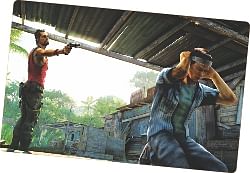 You play Jason Brody, a Californian rich boy who's on vacation with his close friends and family. On a skydiving trip gone wrong, you and the rest of your group fall into the clutches of ruthless pirate drug runners on Rook Island. They control everything, from the drug trade to human trafficking to controlling the island's inhabitants. While trying to escape the prison camp you've been dumped in, your older brother Grant is killed by the psychotic leader of the pirates, a maniacal character by the name of Vaas. You're rescued by the locals, a tribe called the Rakyat, and led to their camp in the town of Amanaki. With the help of Dennis, a jack of all trades and your mentor, you set about trying to rescue your friends and what remains of your family, while carrying out favours for the locals.
You play Jason Brody, a Californian rich boy who's on vacation with his close friends and family. On a skydiving trip gone wrong, you and the rest of your group fall into the clutches of ruthless pirate drug runners on Rook Island. They control everything, from the drug trade to human trafficking to controlling the island's inhabitants. While trying to escape the prison camp you've been dumped in, your older brother Grant is killed by the psychotic leader of the pirates, a maniacal character by the name of Vaas. You're rescued by the locals, a tribe called the Rakyat, and led to their camp in the town of Amanaki. With the help of Dennis, a jack of all trades and your mentor, you set about trying to rescue your friends and what remains of your family, while carrying out favours for the locals.
The island. The original Far Cry game was set on a lush tropical island where the waters were blue and green was in abundance.
Far Cry 3 scraps the African jungle setting of Far Cry 2 and goes back to the original formula, except this time the map size has been multiplied by what seems to be over 9000. It is GORGEOUS. Even if you have no interest in playing through the story, you'll have a ton of fun just exploring the island and finding the secrets stuffed in every nook and cranny. This game never lets you get bored. Go for a swim, kill some sharks, ogle some manta rays, and wrestle alligators if you want. Or grab a bow and arrow and go hunting for birds. Or kill some tigers and leopards with a shotgun. Just do it before animal rights activists get wind of this game and try to ban it to eternal damnation.
If you want a firefight, the game delivers spectacularly.
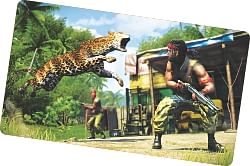 While the number of weapons you can carry can be frustratingly limited (until you craft a larger backpack, more on that later), whatever you get to do, is intensely satisfying. The enemy AI is smart, and uses cover and various combinations of tactics to flush you out of cover and into their iron sights. One time a particularly nasty pirate lit the entire jungle around me on fire to get at me, which was not a very pleasant experience. However, you can use a similar tactic. Arsonists can let their inner demons vent quite easily with this game, just get a flamethrower and start lighting the entire island on fire. The amount of freedom Far Cry 3 gives you is only limited by your imagination.
While the number of weapons you can carry can be frustratingly limited (until you craft a larger backpack, more on that later), whatever you get to do, is intensely satisfying. The enemy AI is smart, and uses cover and various combinations of tactics to flush you out of cover and into their iron sights. One time a particularly nasty pirate lit the entire jungle around me on fire to get at me, which was not a very pleasant experience. However, you can use a similar tactic. Arsonists can let their inner demons vent quite easily with this game, just get a flamethrower and start lighting the entire island on fire. The amount of freedom Far Cry 3 gives you is only limited by your imagination.
You also have a pretty big list of transportation options when you're exploring or heading to missions, whether by land, water, or air. Vehicle controls are precise and smooth, so if you fancy a bit of off-roading, there are ATVs and Jeeps and buggies scattered around the map.
The story flows very nicely, giving you well rounded characters that are distinctly unique from one another. As far as the missions go, you are given complete control over how you want to carry it out. Like Dishonored, you can finish entire missions without having to fire a single bullet or kill a single enemy, using distractions and stealth to get past difficult situations.
The only real complaints I can think of would be the crafting feature and the dialogues. Crafting allows you to harvest plants and skin animals and then create medicine, enhancers, wallets and rucksacks. If you want to carry more weapons and loot, you need to hunt down specific animals and use their skin, which gets annoying in the middle of a mission when you see the need for a sniper rifle but you only brought along a measly shotgun instead. Other than that, the voice acting feels a little wooden at times with a few characters (Vaas is a definite exclusion from this), and the dialogue gets cheesy, Stallone in Rambo and Steven Seagal in Half Past Dead cheesy.
The graphics are mind blowing on a high end PC (DDR5 graphics card, anything above NVIDIA GT440 or AMD 6670 will do brilliantly) and even on medium settings on a mid-level card, you'd be getting a good treat for your eyes. The soundtracks are amazing as well, making Far Cry 3 a complete package in every department.
You NEED to play this one.
Highs:
* Beeeeaaaautiful island to play around on,
graphics and scenery and modelling wise.
* Gameplay sets standards.
* Massive scale, loads of things you can do,
all of them fun.
Lows:
* Crafting menus and levelling up aren't very
user friendly, menus are confusing at first.
* There should be mosquitos and insects.
Seriously, it's hard to find more faults in Far
Cry 3.
Ratings: Gameplay 9.5/10; Graphics and Sound: 9/10; Story: 9/10; Overall: 9.2/10
INTERVIEW
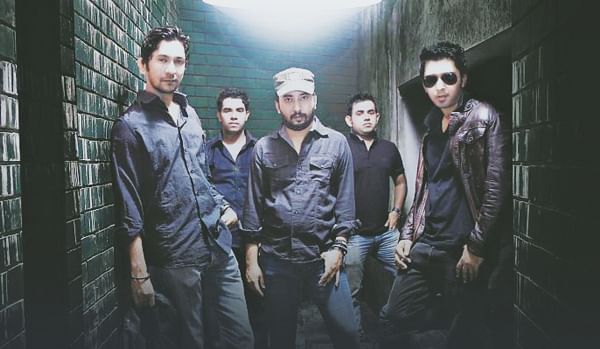
SHIRONAMHIN
AN INTERVIEW OF THE BAND AND AN EXCLUSIVE SNEAK PEEK
INTO THEIR UPCOMING ALBUM
Interview: Mastura Tasnim
Photo: Shironamhin
So let's start from the beginning. How did Shironamhin come about?
We started in 1996 as a campus-based band. Back then there was no such a thing as campus-based bands. It was just the beginning of the underground culture and we watched as many good bands, such as Rockstata, were starting to disband. This happens primarily because underground bands have the tendency to take their music lightly. Shironamhin has been professional about music from the very beginning. We took eight years to release our first album, Jahaji, and then maintained our dedication to music by side-lining our other jobs. In fact, Tuhin and Zia started their own architecture firms to avoid the strings that come with being employees.
People are generally very confused about your genre. What would you classify it as?
Film, painting and sculpture, literature and music move hand in hand through each decade. That's the flow of art. And the same is true for this decade. Time and space are not really a factor nowadays; the world is closer than it ever was. So we're all a little stunned and taken aback. In order to recover from that, we're resorting to all things supernatural, which reflects on popular media. Superhero movies are the highest grossing and fantasy books have a formidable fan-base. This means that music must also have a super-gimmick effect. Shironamhin started off by calling itself an alternative band, but we soon realised our music is lot like rock. So then we said we're performing alternative rock. After Bondho Janala, we're just telling everyone that our genre is Shironamhin. System Of A Down calls itself a theatrical rock band, but when asked, can't really explain what that means. The fact remains that you can't have clearly defined genres anymore - not for movies, not for literature and not for music either.
However, you'll notice that our lyrics speak a lot about urban life - the simple reason for that being all our band members grew up in the city. Our focus has therefore always been on city life, and the little, yet extraordinary stories of city-dwellers.
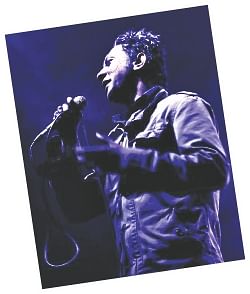 You moved away from your focus when you decided to release the Rabindranath album. What prompted that?
You moved away from your focus when you decided to release the Rabindranath album. What prompted that?
Actually, we presented Rabindrasangeet in a very urban style. We weren't planning on working on this even though all of us really admire Rabindranath's music. For Tuhin it was a little different as he had been taught Rabindra Sangeet ever since he was a child and for musicians trained in that genre, their career doesn't seem fulfilled until they've released an album based on it. So he asked for our help and we went along with the idea, keeping in mind that people expect a certain Shironaamhin feel to the music. We were determined to keep the tune and lyrics the same - which was the easy part. We had to study a lot into each and every song we produced - we'll give a small example. Back then there was no way of recording and conveying music from distant parts of the world, so when Rabindranath stumbled upon this beautiful piece of music in Scotland - 'Ye banks and braes' - the only way he could relay that music to Bengalis was to transform it in Bangla when he returned. Unfortunately, when Fule Fule was recorded later on in the sub-continent, the tempo of the song fell due to technical difficulties. We recognised this flaw and kept the beat of 'Ye banks and braes'- the beat that Rabindranath intended to keep in the first place. We even have a friend who played this song in the annual procession held in Edinburg help us out with it and we used the Scottish tin-flute.
While recording Srabone Gogone we had someone come in to the studio and dance the kheyal raag for us, as this song was associated with the nobles who spent their leisure time surrounded by dancers. So you can clearly hear the sound of the anklet and it seems like someone is dancing nearby.
There was nothing creative about it though. Tributes can never be creative.
Is the up-coming self-titled album a way to get back to your creative side?
It has been nearly two and a half years since we released Bondho Janala, and we've been working on the next album ever since . We went back in time to meet the master musician Rabindranath himself, and I think that lent us a lot of maturity as well. So we feel really good about our music right now and wanted to go ahead with what we consider is our best work - hence, self-titled. We pride ourselves on being self-sufficient: Zia usually writes the lyrics, records and produces the music, Tuhin sings and we all play different instruments. And since we're architects, we deal with the graphics too. Although we've welcomed guest artists for the previous albums, we tried to master all the instruments for this one, ourselves. Sarod has been associated with Shironamhin a lot, and there are a lot of youngsters who've taken it up simply because of us. Just as Arnob helped esraj come back into the modern music scene, we helped sarod. Ordinarily we took help for that, but in this album Zia is playing it mostly; Shafin plays it once. Learning the violin was tough for Zia - he had to isolate himself for three months to master it.
As for the lyrics, we've dealt with magic-realism before, which is basically presenting a fictitious idea as if it were true. In Hashimukh, we tried to show that we'd go a long way to see a joyous face, when in fact, there's no reason to believe that there will be a happy face at the other end. The face of course, was a symbol for our country's future, and sadly, it's only getting worse. In the sequel of this song, Abar Hashimukh, we'll be showing how we might sacrifice a lot for this smile, even flee from a torture cell, but at the end we might have to kill ourselves. There's also a song named Atotai for which Zia needed to carry around a dagger for some time, just to bring more life into the song. You'll hear the story behind that one soon, it's a surprise.
So this album is going to be really special one. We don't think there's a single band out there that learned an instrument just to play one pitch in one song. But we did.
You're all from different musical backgrounds. How do you manage to synchronise your ideas?
Well, whoever wrote the lyrics to the piece under discussion gets to have the first say, and then all of us drop ideas. Then we move on to music composition and follow the same process. It's a lot of editing, really, but at the end of it, we all try to contribute constructively to form the best combination of all of our individual talents.
Diyat, who is with Urban Fictions, must sometimes face schedule clashes between his two bands. How does everyone handle this?
Well, there's no clash most of the time. Diyat plans out his time and knows how to prioritise, so that there are no last minute cancellations for any band. And since both bands know each other well, we know how to handle one mutual member. We imagine this sort of thing maybe problematic for other bands, but we haven't faced any hurdles yet.
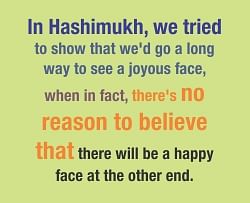 You've been here since the beginning of the underground culture. How do you think it's doing today?
You've been here since the beginning of the underground culture. How do you think it's doing today?
The underground culture was doing fairly well in 2005-7. But right now, it's stopped growing. One of the major reasons for that is piracy. Label companies aren't very willing to go ahead and sponsor new-comers who might or might not earn them profit. So musicians have to subsidise their albums and a band might do this once, even twice but it's very unlikely they'll do it a third time.
Then there's the entire inertia of an underground band. They tend to stay small-scale and are generally less ambitious. We've seen how certain bands have a select group of fans, primarily from their friend-circle, who listen to their music and don't really bother to listen to that of others. In this regard, Zia believes push-selling was a good thing for the underground scenario. It was introduced at the very beginning so that bands could pay their way into shows, but then it was brought down when people rebelled against the idea. And of course, ethically, it does seem wrong. But practically, it could really help out a lot of the new-comers to show-case their talent to a larger crowd.
Certainly, the music industry has enjoyed a lot of exposure lately as media has grown. What with the increase in the number of TV channels and FM Radio stations along with the increasing access to the World Wide Web, performers have been able to gain more listeners faster and easier. But the problems remain like a bottleneck in the progress of the underground music scene.
What is the motive of your music? A lot of people sing to satisfy themselves, many sing so that other may relate to them, and yet others can't help but sing.
Our main aim is to reach the masses. That is, we want people from all over the country to be able to relate to our music. We've heard a tea-stall owner humming our music while making tea and met private university students who are our fans. This one time, a man nearly ran his cow over one of us while screeching 'Tumi cheye acho tai ami pothe hete jai!' while another time a rickshawala was singing one of our songs. None of them recognised us, but they knew our music. This is an achievement in our eyes - to make people from different age-groups and different professions fall in love with a song. James was able to do it, and there are bands here and abroad who have done it. It's very rare and it's very difficult, but we're making 10 golden songs in this album, and hopefully 3-4 of them will be like this.
Any stories about the band?
The last time when we went to Foi's Lake for a concert, our sound engineer, Mithu bhai, tagged along. We were staying at the resort and Mithu bhai insisted on showing us a Buddha swimming pose in the pool attached to it. We took photos of that and had good laugh. Later when we got on stage, the crowd seemed a little quiet and surprised. At the end of our performance, some of them came forward to ask which member of our band had drowned and shared their condolences. Chinese whispers work in peculiar ways.
MUSIC
THE SONG REMAINS THE SAME
By Samiha Matin
 Led Zeppelin is undoubtedly the most iconic band that ever was - with their signature voice, legendary guitar solos and furious drumming - the band practically defined rock and roll. And for Zeppelin fans out there, The Song Remains the Same is a treat - containing concert footage and a private tour of the four members who became legends. Starring of course the four band members, Robert Plant (vocalist) Jimmy Page (guitarist), John Paul Jones (bassist) and John Bonham (drummer) the movie is set in Madison Square Garden, 1973, where the band played for three sold-out nights consequently. The movie is mostly concert footage but also contains 'fantasy sequences' of the four members to portray their personalities.
Led Zeppelin is undoubtedly the most iconic band that ever was - with their signature voice, legendary guitar solos and furious drumming - the band practically defined rock and roll. And for Zeppelin fans out there, The Song Remains the Same is a treat - containing concert footage and a private tour of the four members who became legends. Starring of course the four band members, Robert Plant (vocalist) Jimmy Page (guitarist), John Paul Jones (bassist) and John Bonham (drummer) the movie is set in Madison Square Garden, 1973, where the band played for three sold-out nights consequently. The movie is mostly concert footage but also contains 'fantasy sequences' of the four members to portray their personalities.
With Page's electrifying guitar and his cheeky smiles (girls, prepare for a treat!), Plant's soaring vocals and dancing, Bonham's aggressive and speedy drumming and Jones' breathtaking melodies at New Quarter - one thing is for sure, no matter how much the critics jab at the movie for having a poor production, these rock gods indeed know how to put on a show. Lots of smoke effects, lights, and Plant's incredible vocal take on the sound effects produced by synthesizers - this concert really showcases the band at its glory days. Page steals the show most of the time but then again with guitar skills like his how could he not.
Then there are the fantasy sequences, which at times seem very magical and straight out of a fantasy novel with Plant playing a knight rescuing a maiden in Wales, Page playing a hurdy gurdy and climbing a snow capped mountain in search of the Hermit, Bonham spending his time with family and drag racing and Jones as a masked horseman, riding in the night with three others. With classic Zeppelin songs as background to all these sequences, these are brilliant to watch and show the band members outside their life on stage.
As for highlights: watch Page at Rock and Roll, and Since I've been Loving You, playing guitar with a cello bow at Dazed and Confused and of course the extended guitar solo at Stairway to Heaven, Plant's unfaltering vocals at all the songs, Bonham at Moby Dick (honestly a must-watch!) and Jones at No Quarter and more (though often the poor guy is too much in the background). All in all, a must watch for any Zeppelin fan.
